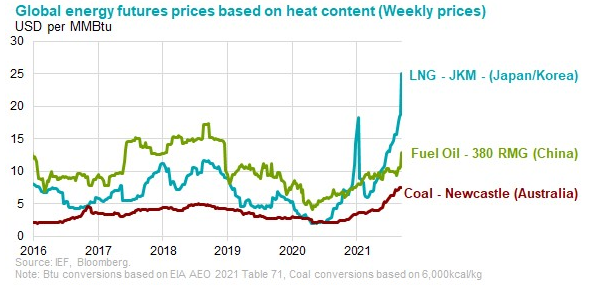China’s energy industry is caught between a rock and a hard place. As the world’s second-largest economy has surged back to life in the wake of the novel coronavirus pandemic, energy demand has skyrocketed, leading to soaring fuel prices and unprecedented decisions out of Beijing to compromise some of the country’s energy security in the interest of keeping the lights on in the immediate term. What’s more, all of this is taking place as the Chinese economy enters a slowdown and inflation rates are on the rise.
“Inflation is soaring, and the country's producer price index hit a 13-year high last month, driven by rising commodity prices,” CNN Business reported about the Chinese economy’s woes earlier this month. “The government has warned that high costs for raw materials such as energy and petrochemical products will exacerbate growth and employment challenges facing manufacturers—especially small and medium-sized businesses.”
It is against this worrying backdrop that Beijing made the historic decision to sell off some of the oil that President Xi Jinping’s administration has been stockpiling for years in a strategic reserve. China, the world’s biggest oil importer and second-biggest oil consumer in the world, is heavily dependent on foreign oil to keep the economy afloat.
Correcting for this glaring vulnerability has put energy security at the center of China’s energy policy for a long time now. But now Beijing’s sole focus seems to be damage control.
In fact, thanks to the skyrocketing demand for electricity, some provinces are even experiencing the worst power shortages the country has seen in a decade. And to make things worse, coal prices have started to climb, and Chinese electricity companies are facing the very real possibility of bankruptcy.
Coal makes up more than 50 percent of China’s energy mix, and a recent row with Australia had already made Chinese coal supplies particularly tight before the recent demand spike. In fact, the unofficial embargo against Australian coal reportedly caused its blackouts throughout China earlier this year.

Now, multiple groups of coal-fired power companies are petitioning the Chinese government to charge Chinese residents more for electricity in order to stay afloat. Even as coal prices are shooting through the roof, Chinese coal-fired power plants can legally only raise their prices by a maximum of 10 percent in response to rising operational costs. Making matters worse, last year China’s top economic planning agency, the National Development and Reform Commission, barred rate rises entirely.
Chinese coal-fired power stations are now crying out that something’s gotta give. The Beijing Electric Power Industry Association sent a letter to the Beijing Municipal Commission of Urban Management petitioning for higher electricity prices earlier this month.
According to the South China Morning Post reporting last week:
“Five member companies had incurred losses in the first seven months of the year, ranging from 20 million yuan (US$3.1 million) to 192 million yuan. The petition echoed a letter sent by 11 coal-fired power companies within the Beijing-Tianjin-Tangshan power grid last month, which said they were losing money and were on the verge of bankruptcy due to steep increases in coal prices.”
According to the letter, as of July, coal prices had risen by 65.3 percent compared to a year before.
The severity of the shortage and the potential for prolonged economic fallout has many wondering how far Beijing will have to bend to keep a lid on the potential looming crash. It has been widely speculated that Xi Jinping will soon have to end his unofficial moratorium on coal imports from Australia in order to meet demand.
It’s also highly questionable whether Beijing will be able to keep its climate commitments, which largely hinge on cutting down the nation’s dependence on coal, the dirtiest fossil fuel in terms of carbon emissions. While Xi Jinping has been making lofty promises to decarbonize by 2060, China and India have been dually responsible for increasing demand and raising global coal prices even as the global community makes a push toward a green energy transition.
